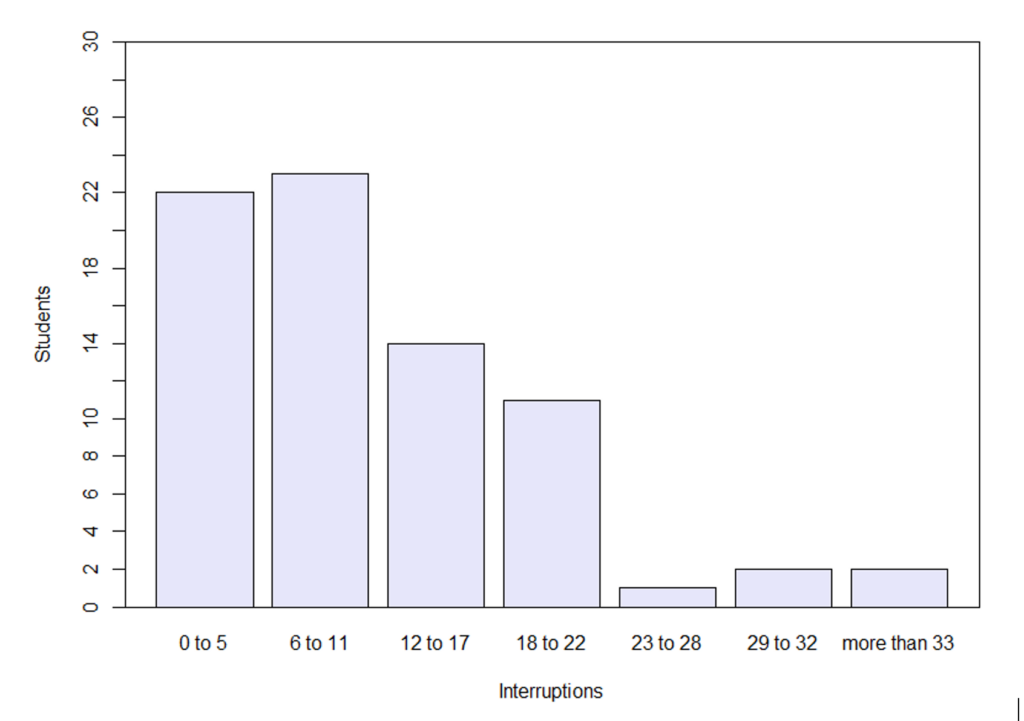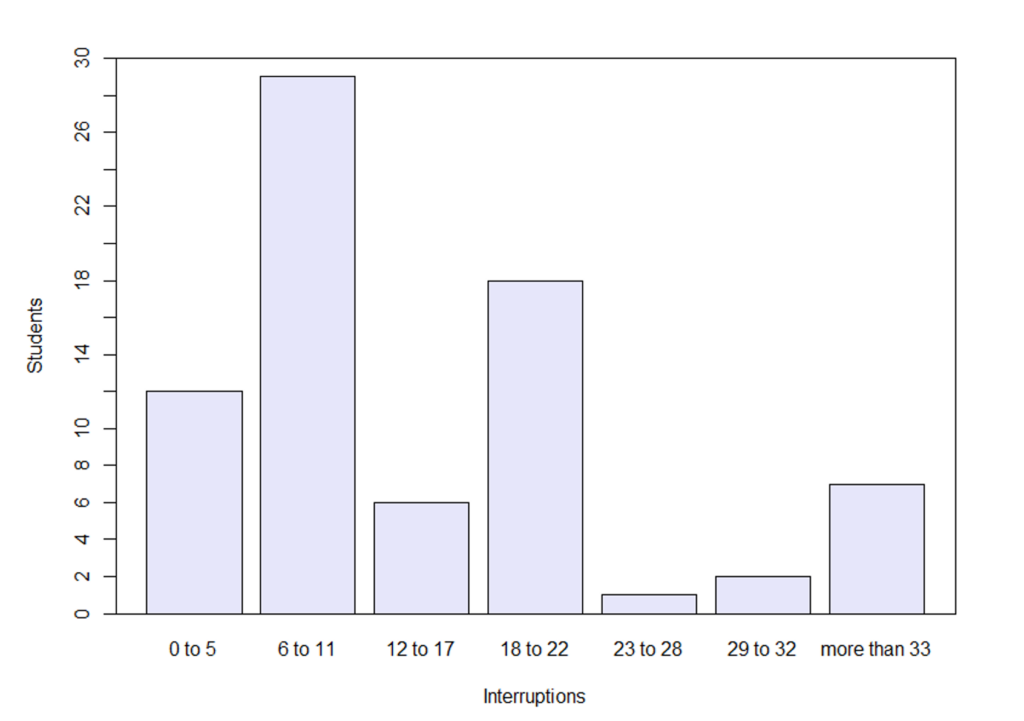How can an inappropriate use of technologies affect my performance?
By Aurora Vizcaino (University Professor)
After more than twenty years teaching at ESI, I began to notice that my students were retaining less and less information. In my first years as a teacher, the students remembered what I had taught them the previous week and they barely remembered the concepts seen two weeks before, but each year the situation worsened and there came a time when the students did not even retain the information that I had explained to them. that same morning. This fact worried me a lot and I began to investigate what could be the reason: Could it be that I was getting older and no longer connected with my students? What could it be? So I started to investigate… what had changed in the classrooms?
The students no longer came with their notebooks and pens, now they came to class with their mobiles and laptops and the first thing they did was go over social networks, so…. I thought, this is the reason why my students retain less information… Let's see what the literature says about how interruptions affect our work.
In direct relation to the academic world, several studies [1]–[4] indicate that using laptops in the classroom distracts both students and peers who have direct vision of them, which ends up influencing their learning. Some studies [5] even blame the use of electronic devices for the poor academic performance of students. Another study [6] stated that students can only maintain their attention on academic subjects for a period of about 6 minutes and then need access to a technological distraction. This information worried me greatly, imagine what a class would be like if we had to interrupt it every 6 minutes….
Very interested in this topic, I encouraged other colleagues to carry out a study and find out how many interruptions a student "suffered" in class and during their study time (at home, in residence, library). The study involved 75 students in the second year of the degree in Computer Engineering in Ciudad Real. The results showed that in most cases the number of interruptions during an hour of study ranged between 0 and 22 (See Figure 1), with most in the range between 6 and 11 interruptions. If we take into account that returning to the previous state of attention requires an average of about ten minutes, it implies that, if students suffer approximately 10 interruptions per hour of study, the time for concentration and use in one hour of study is minimal.

Similar data was found in the case of interruptions during an hour of class, as shown in Figure 2. In this case, 24% of the students had between 18 and 22 interruptions, which is surprising and at least worrying for me.

Another useful technique to control interruptions is time management, understood as the ability to plan the time dedicated to studying and completing tasks, something whose management is commonly problematic for students [9]. Several studies [7], [9]–[13] have investigated the relationship between the correct organization of time and their academic performance.
With these ideas in mind, the ESI organized a workshop for first-year students to deal with different techniques of mindfulness and to learn to manage time and thoughts.
After putting this activity into practice, I began to inform my students on the first day of class about the fact that ten interruptions in class mean losing study and class time. Since then, students do not use their mobile phones in class and the computer only when it is strictly necessary for some subject related to the subject. The results have been surprising, the students are more focused and retain the information for longer, so I am very happy to have carried out this activity together with my classmates and above all to notice the improvement in the attention and retention of the students.
Thank you for using new technologies wisely, being you who controls them and not them you.
If you want to know more about the subject, I invite you to read the results obtained in our study or watch the video where it is explained in: Teaching students how to improve their attention and time management Aurora Vizcaíno, Ignacio García-Rodríguez de Guzmán, José Antonio Cruz-Lemus, Félix García, Antonio Manjavacas and Manuel Ángel Serrano.
REFERENCES
[1] S. Feng, YK Wong, LY Wong, and L. Hossain, "The Internet and Facebook Usage on Academic Distraction of College Students," Comput. Ed., vol. 134, no.o 1, p. 41-49, Jun. 2019. [2] JH Kuznekoff and S. Titsworth, "The Impact of Mobile Phone Usage on Student Learning," Commun. Ed., vol. 62, no.o 3, p. 233-252, Jul. 2013, doi: 10.1080/03634523.2013.767917. [3] LE Levine, BM Waite, and LL Bowman, "Electronic media use, reading, and academic distractibility in college youth," Cyberpsychol. Behav., vol. 10, no.o 4, p. 560-566, 2007, doi: 10.1089/cpb.2007.9990. [4] G. Mark, D. Gudith, and U. Klocke, "The cost of interrupted work: more speed and stress," in Proceedings of the twenty-sixth annual CHI conference on Human factors in computing systems – CHI '08, Florence, Italy, 2008, p. 107. doi: 10.1145/1357054.1357072. [5] LR Elliott-Dorans, "To ban or not to ban? The effect of permissive versus restrictive laptop policies on student outcomes and teaching evaluations”, Comput. Ed., vol. 126, no.o 1, p. 183-200, Nov. 2018. [6] S. Kessler, "38% of College Students Can't Go 10 Minutes Without Tech," Wakefield Research, May 31, 2011. https://www.wakefieldresearch.com/blog/2011/05/31/2195 (accessed June 2, 2022). [7] AW Hanley, MH Palejwala, RT Hanley, AI Canto, and EL Garland, "A failure in mind: Dispositional mindfulness and positive reappraisal as predictors of academic self-efficacy following failure," Staff. Individual differ., vol. C, no.o 86, p. 332-337, 2015, doi: 10.1016/j.paid.2015.06.033. [8] P. Liborius, H. Bellhäuser, and B. Schmitz, «What makes a good study day? An intra-individual study on university students' time investment by means of time-series analyses». Learn. instr., vol. 60, no.o 1, p. 310-321, Apr. 2019. [9] J. Fish, J. Brimson, and S. Lynch, "Mindfulness Interventions Delivered by Technology Without Facilitator Involvement: What Research Exists and What Are the Clinical Outcomes?" Mindfulness, vol. 7, no.o 5, p. 1011-1023, 2016, doi: 10.1007/s12671-016-0548-2. [10] WC Jacobsen and R. Forste, "The Wired Generation: Academic and Social Outcomes of Electronic Media Use Among University Students," Cyberpsychology Behavior. Soc. Netw., vol. 14, no.o 5, p. 275-280, May 2011, doi: 10.1089/cyber.2010.0135. [11] SNMS Khan, "The Impact of Time Management on the Students' Academic Achievements," J. Lit. Lang. linguist., vol. 11, no.o 0, p. 66, 2015. [12] JM Kraushaar and DC Novak, "Examining the Affects of Student Multitasking With Laptops During the Lecture," vol. 21, p. 12. [13] MD Mrazek, MS Franklin, DT Phillips, B. Baird, and JW Schooler, "Mindfulness training improves working memory capacity and GRE performance while reducing mind wandering," Psycho. Ski., vol. 24, no.o 5, p. 776-781, May 2013, doi: 10.1177/0956797612459659.










